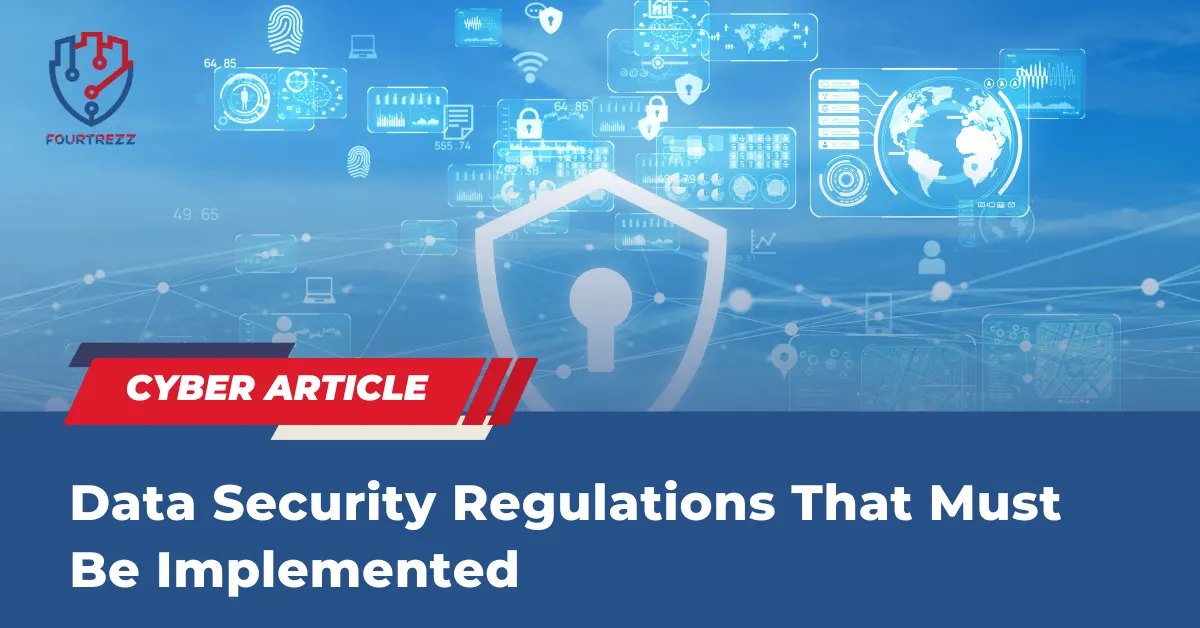Data security is of paramount importance in today’s digital age. The more information is stored and transmitted via the internet, the greater the risk of it falling into irresponsible hands. Therefore, it’s crucial for organizations to ensure that their data is secure and protected in accordance with applicable regulations.
To assist organizations in ensuring data security, we use the MECE (Mutually Exclusive and Collectively Exhaustive) framework. This framework helps to break down the topic into parts that are mutually exclusive and cover all important aspects.
In this article, Fourtrezz will provide information on data security regulations that organizations must implement, including but not limited to GDPR, HIPAA, and PCI-DSS. We will delve into these regulations in depth and give examples of how organizations can ensure they meet regulatory requirements.

Definition and Explanation of Data Security Regulations
Data security regulations are rules and laws governing how organizations must protect and manage personal data collected from individuals. The goal is to protect the privacy and rights of individuals concerning their personal information.
Some common data security regulations applied worldwide include the GDPR (General Data Protection Regulation) from the European Union, the HIPAA (Health Insurance Portability and Accountability Act) from the United States, and the PCI-DSS (Payment Card Industry Data Security Standard) for the banking and payment industry.
These regulations have several requirements that organizations must fulfill, such as transparent data collection for legitimate purposes, secure data storage, and limiting access to personal data strictly to authorized individuals.
By understanding and complying with data security regulations, organizations can ensure they do not break the law and protect the privacy and rights associated with personal information of individuals.
Types of Data That Require Regulation
There are several types of data that require security regulation to protect the privacy and rights of individuals. Here are some of the most commonly protected data types:
Personal Data – Personal data is information about an individual that can be used to identify them, such as their name, address, telephone number, and email address.
Financial Data – Financial data includes information about an individual’s financial transactions, such as credit card information and bank account details.
Health Data – Health data comprises medical information about an individual, such as medical examination results and health history.
Intellectual Property Data – Intellectual property data includes artworks, patents, trademarks, and copyrights.
To protect the privacy and rights associated with these types of data, security regulations ensure organizations manage and safeguard information securely.
Regulatory Bodies and Laws Covering Data Security
The importance of data security necessitates regulations and laws to ensure the implemented security measures by organizations. Regulatory bodies play a significant role in defining the regulations and laws related to data security that organizations must implement.
One well-known regulatory body is the General Data Protection Regulation (GDPR), which applies in the European Union. GDPR provides guidance and regulations for organizations processing personal data of EU citizens, including requirements to protect privacy and individual data rights.
In the United States, the Health Insurance Portability and Accountability Act (HIPAA) is responsible for regulating the security of health data. Meanwhile, the Payment Card Industry Data Security Standard (PCI-DSS) sets security standards for organizations dealing with financial data.
With regulatory bodies and laws governing data security, it ensures that organizations maintain data security and protect individual privacy. Therefore, it’s vital for organizations to understand the regulations and laws applicable to them to ensure proper data security implementation.
The Importance of Complying with Data Security Regulations
Data security regulations play a critical role in protecting privacy and preserving the dignity of individuals. Non-compliance can result in:
- Severe fines from regulatory bodies
- Damaging the company’s image and losing customer trust
- Legal claims from individuals whose privacy has been infringed
On the other hand, complying with data security regulations has benefits such as:
- Maintaining privacy and preserving the dignity of individuals
- Enhancing customer trust and maintaining a good company image
- Avoiding legal claims and severe fines
- Improving data security and integrity
Best Practices to Ensure Data Security
Best practices for ensuring data security are crucial in making sure that personal, financial, health, and intellectual property data remains secure. A review of best practices helps understand the necessary actions to ensure data security. Some of these best practices include:
- Access control: Limiting access to sensitive data only to individuals who need to access it.
- Data encryption: Using encryption technology to protect data during transmission or storage.
- Staff education: Educating staff on the importance of data security and how to protect it.
- Activity monitoring: Monitoring activities to ensure that only authorized individuals access the data.
- Risk analysis: Conducting regular risk analyses to identify potential threats and take action to minimize risks.
Implementing these best practices helps ensure that critical data remains safe and isn’t exposed to unnecessary risks.
Conclusion
The conclusion from this article is the importance of complying with data security regulations to protect personal, financial, health, and intellectual property data. These regulations are implemented by regulatory bodies with the aim of protecting privacy and ensuring that such data isn’t misused.
Non-compliance with data security regulations can have serious consequences, such as fines and legal actions. Therefore, it’s crucial for organizations to ensure that they comply with these regulations and implement best practices to guarantee data security.
As a recommendation, organizations should continuously monitor data security regulations and make efforts to ensure that they comply with the latest rules. Implementing best practices to ensure data security is also part of the organization’s responsibility towards their customers and society at large.










